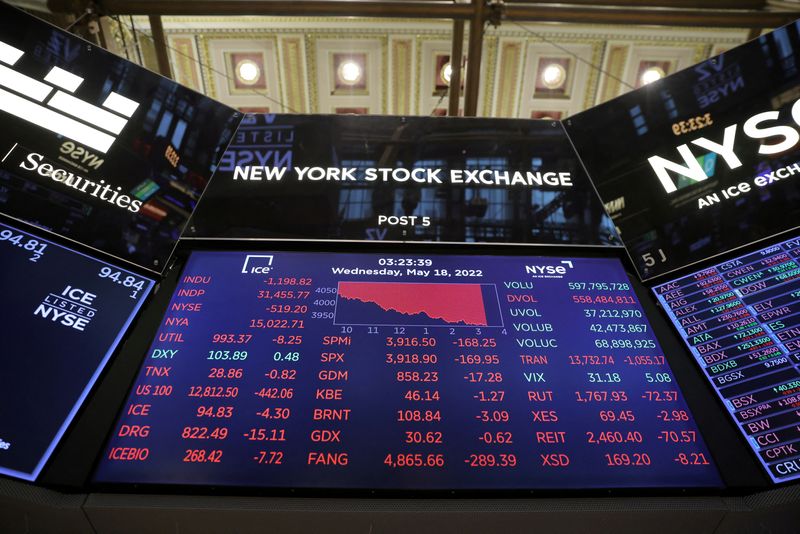U.S. congressional panel calls for new trading rules after ‘meme-stock’ saga
2022.06.24 17:30

FILE PHOTO: A monitor displays stock market information on the trading floor at the New York Stock Exchange (NYSE) in Manhattan, New York City, U.S., May 18, 2022. REUTERS/Andrew Kelly/File Photo
By Katanga Johnson and John McCrank
WASHINGTON (Reuters) – Wall Street regulators need to do more to address market risks highlighted by the “meme-stock” trading frenzy of January 2021 that pitted individual investors in GameStop Corp (NYSE:GME) against powerful hedge funds, a congressional report said Friday.
The report by the U.S. House of Representatives’ Financial Services Committee singled out Robinhood (NASDAQ:HOOD)’s trading app for “troubling business practices” and said regulators need to step up scrutiny of the company.
The report also called for new brokerage liquidity rules and for regulators to hasten a crackdown on the “gameification” of trading, game-like features that prompt users to trade more.
“The meme stock saga has raised questions about how retail trading market infrastructure currently operates and whether it is appropriately designed and regulated,” the report said.
Meme stock trading is still happening, with cosmetic company Revlon Inc the latest example.
The report, which was prepared following hearings in February 2021, analyzed how money was made and lost so quickly when GameStop shares surged more than 1,600% in January that year, then collapsed. It will increase pressure on regulators to prioritize the proposed fixes.
During the GameStop episode, retail investors banded together in online forums to push up the stock’s price and force hedge funds that had bet against it, known as short selling, to unwind their trades.
The panel did not cast blame but instead proposed tightening regulatory gaps. The report called for the Securities and Exchange Commission (SEC) and the Financial Industry Regulatory Authority (FINRA), Wall Street’s self-funded watchdog, to craft new rules to address what it called “a culture that prioritizes growth above stability.”
Specifically, the panel recommends the SEC introduce a liquidity rule for clearing brokers, and for FINRA to establish a framework governing liquidity planning for clearing brokers, rather than current voluntary guidance.
Both FINRA and the SEC, which have stepped up scrutiny of “gameification,” should also bolster regulations curbing the extension of margin trading to customers, the report said.
The panel also recommends that brokers that execute above a certain threshold of retail orders connect to a public market like NYSE or Nasdaq, rather than sending orders to wholesale market makers for a fee, a practice known as payment-for-order flow (PFOF), as Robinhood had been during the GameStop saga.
SEC Chair Gary Gensler, whose agency also last year issued a report https://www.sec.gov/page/sec-staff-release-gamestop-report#:~:text=The%20Securities%20and%20Exchange%20Commission,several%20questions%20about%20market%20structure on the GameStop saga, has said the agency would address gameification, PFOF and short selling disclosures, among other issues.
He recently unveiled a planned overhaul of trading rules that aim to ensure mom-and-pop investors get the best deal.








